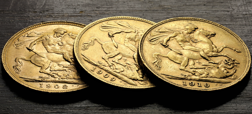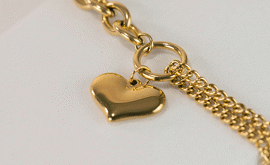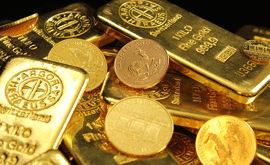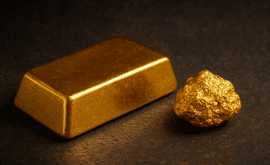UK Coin Values
In this article, we will examine the different types of UK gold coins commonly found on the market, and how to calculate their value. We will also guide you on where to sell your gold coins in the UK in order to unlock their potential worth.
Different types of gold coins
When navigating the world of gold coins, it is often useful to be familiar with the various types available. Each gold coin comes with its own unique history, design, and value. The following are some of the most common types of modern and historic gold coins in the UK:
- Sovereigns: The gold sovereign is one of the most recognisable and sought-after gold coins in the world. First introduced in 1489 during the reign of King Henry VII, these coins have a rich heritage and are still a popular choice for collectors today. Struck in 22ct gold (91.67% fine gold) by The Royal Mint, sovereigns are a symbol of British sovereignty and are often referred to as the ‘chief coin of the world’.
- Half Sovereigns: Half sovereigns are smaller denominations of the iconic sovereign coins. First introduced in 1817, they contain half the gold content of a full sovereign, weighing around 3.99 grams, and are struck in 22ct gold. Despite their smaller size, half sovereigns carry historical and numismatic value, making them a popular choice with collectors around the world every year.
- Britannias: Britannia gold coins were first minted in 1987 and feature the image of Britannia, the female personification of Great Britain and a symbol of the country’s strength and integrity. These coins are struck by The Royal Mint in 24ct fine gold making them highly popular for their bullion value. Gold Britannia coins are available in a variety of different weights, ranging from one-tenth of an ounce to one ounce, catering to a wide range of budgets and requirements.
- Guineas: The gold guinea coin was minted between 1663 and 1814 and played an important role in British commerce and trade in the 17th and 18th centuries. Originally valued at one pound sterling, these coins featured detailed designs and weighed around 8.38 grams. Although no longer in circulation today, gold guineas hold historical significance so are still often highly valued by collectors of UK gold coins.
- Modern commemorative coins: In addition to traditional gold bullion coins, The Royal Mint also produces commemorative coins to mark notable events or anniversaries. These coins often feature special designs and have limited mintages, which can add to their collectability and value.
What determines a coin’s value?
A wide range of factors can affect the value of a gold coin and decide whether it may increase in value. These factors can sometimes go beyond the gold content of the coin, and can also include the coin’s collectability, condition, and rarity.
- Metal percentage: The fineness and weight of the metal used in a coin affect its value. Higher gold content within the coin usually means the coin is worth more, particularly in bullion coins which are often intended for investment purposes.
- Collectability: The desirability of a coin to collectors can impact its value. Coins with special or unique designs, historical significance, or limited mintages can often fetch higher prices due to their appeal to collectors.
- Condition: The condition of a coin can help to determine its value. Coins in pristine condition, with minimal wear and tear, are generally more sought after and can fetch higher prices compared to those with signs of damage or wear.
- Rarity: The rarity of a gold coin can directly affect its value. Coins with low mintages or those that are no longer in circulation can sometimes be more valuable due to their limited availability.
How much are gold coins worth in the UK?
Working out the value of a gold coin in the UK involves considering a range of factors. While the value of the pure gold within the coin forms the basis of its price, numismatic value and collector demand can also occasionally influence its overall worth.
The following factors are helpful when attempting to calculate the value of a UK gold coin:
- Gold content: The first step in assessing a gold coin's value is to determine its gold content. This is typically expressed in terms of weight (troy ounces or grams) and fineness (parts out of 1,000).
- Current gold price: The value of gold coins is tied to the constantly fluctuating price of gold. As the gold price changes, so does the value of gold coins, reflecting changes in the metal's worth.
- Market demand: The demand for specific types of gold coins can fluctuate based on historical significance, rarity, or collector interest. Coins with unique designs, limited mintages, or ties to noteworthy events can also sometimes help to increase demand for a coin, and therefore its value.
To assist in estimating the value of some of the most common UK gold coins, the following table provides a guideline based on weight, fineness, and fluctuating gold price:
| Coin Denomination | Weight (grams) | Fineness (parts out of 1,000) | Gold Content (grams) | Current Gold Spot Price (per t/oz) * | Estimated Value (based on current gold price) |
|---|---|---|---|---|---|
| Sovereign | 7.98 | 916.7 | 7.32 | £1,866.00 | £439.25 |
| Half Sovereign | 3.99 | 916.7 | 3.66 | £1,866.00 | £219.62 |
| Britannia | 31.10 | 999.9 | 31.10 | £1,866.00 | £1,866.00 |
| Guinea | 8.38 | 916.7 | 7.68 | £1,866.00 | £458.10 |
| Queen's Beasts | 31.10 | 999.9 | 31.10 | £1,866.00 | £1,866.00 |
The values provided in the table are for reference purposes only and are based on the spot price of gold only. Please note that it is extremely rare to be able to buy or sell gold coins at spot price as premiums must be added and profit must be made. Prices may also vary based on individual market conditions and factors specific to each coin. We recommend consulting with a reputable gold coin dealer in order to receive accurate real-time pricing information.* Live Spot price of gold, correct as of 23rd April, 2024.
Where to sell your gold coins in the UK
When it comes to selling your precious gold coins, trust and transparency are essential. It is important to conduct thorough research to ensure you sell to an established and trusted business to get the fairest price.
At Atkinsons Bullion & Coins, we specialise in the buying and selling of gold and silver, offering you the fairest prices for your bullion items. With over 30 years of experience serving customers across the UK, we pride ourselves on delivering a trustworthy and reliable service.
Selling your gold coins is a significant decision, and that is why we strive to make the process as seamless and straightforward as possible. Our ‘Sell to Us’ feature allows you to fix your price online at your convenience, and you can find a list of the prices we are paying for some of the most common gold coins, including Britannias and Sovereigns, on our website. Prices vary depending on the item, but rest assured, we always aim to offer competitive rates.
If you believe now is the right time to sell your gold, Atkinsons is here to help. Whether you choose to send your items to us through the post or prefer to visit our secure showroom to sell to us in person, we are here to assist you every step of the way. For more information or to obtain a quote tailored to your needs, feel free to email us at info@atkinsonsbullion.com or call the team on 0121 355 0620. Let us help you unlock the true value of your gold coins today.
This blog represents one person’s opinion only. Please note, gold and silver prices may go down as well as up. Atkinsons Bullion & Coins accepts no responsibility for any losses based on information we have provided. We do not offer investment advice. Please carry out your own research before making an investment decision.













